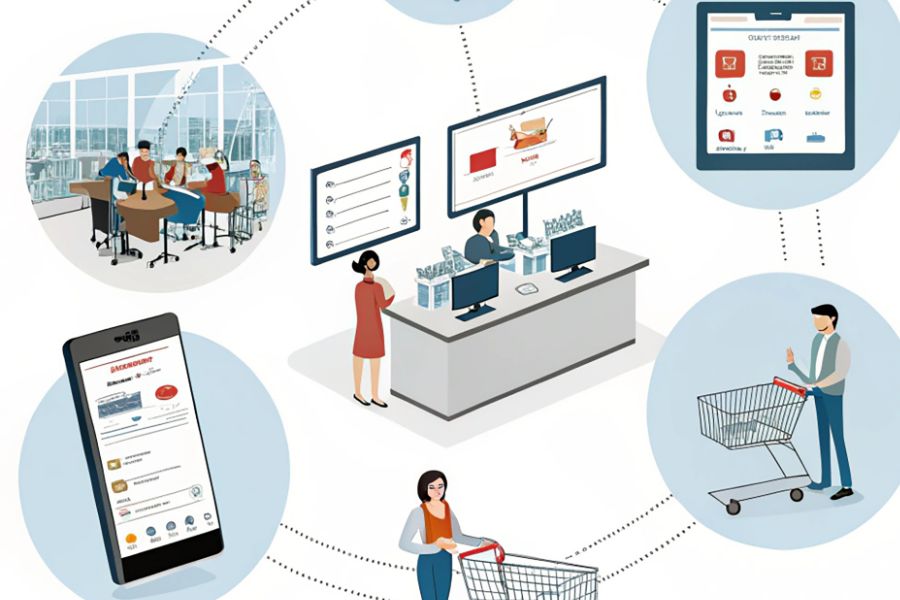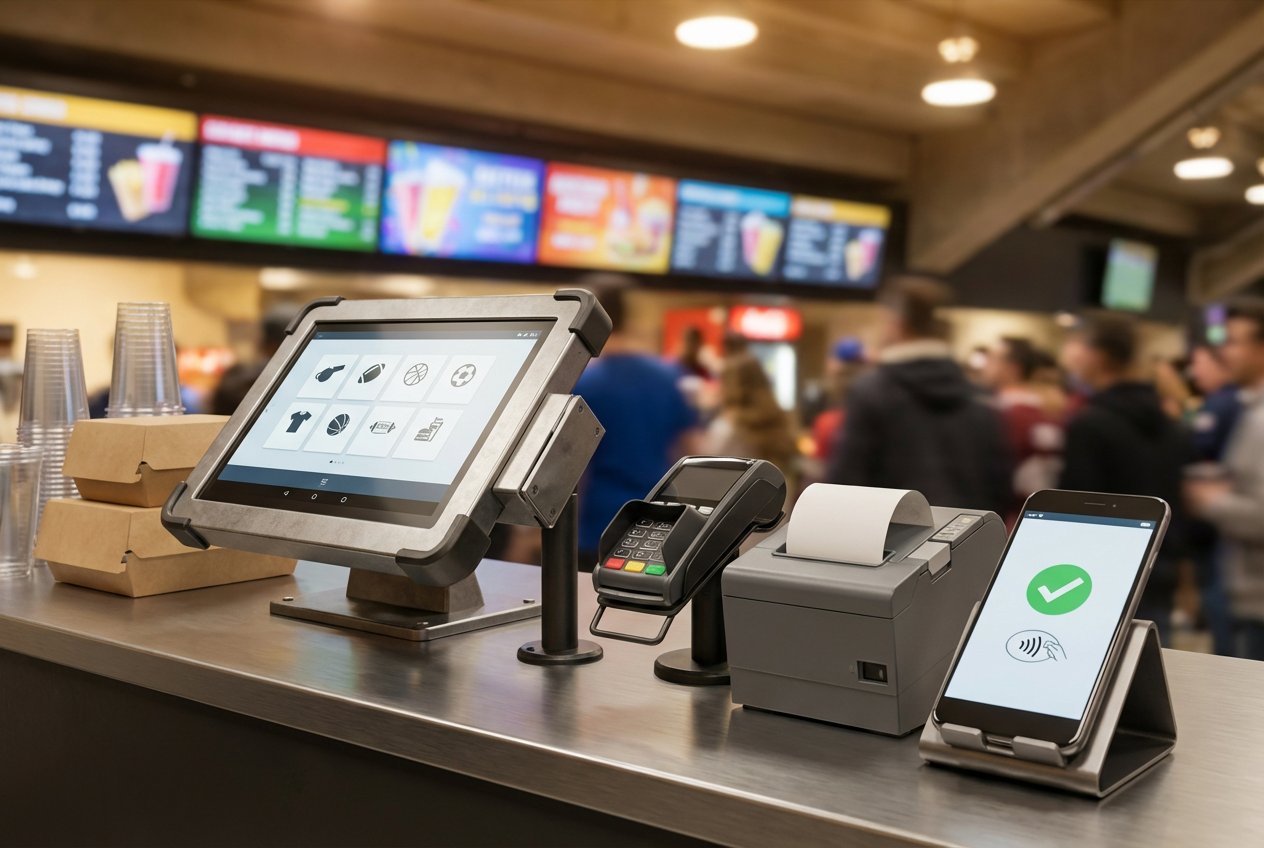How do businesses generate leads, nurture prospects, and close sales efficiently in an increasingly competitive market? With CRM and marketing automation platforms, companies can automate repetitive tasks, nurture leads effectively, and personalize customer engagement while driving productivity. With over 56% of businesses already using marketing automation software and many more planning adoption, choosing the right platform is a decisive step for growth in 2026. This article from ConnectPOS advises on the 5 best enterprise marketing automation software in 2026 to help businesses identify the right solution for sustainable growth.
Highlights:
- Enterprise marketing automation software centralizes campaign management, customer data, and workflows to help large businesses scale personalized engagement.
- In 2026, automation is vital for enterprises to handle rising customer expectations, unify digital and in-store experiences, and achieve data-driven growth.
- The top 5 solutions: ConnectPOS, HubSpot Marketing Hub, EngageBay, Zoho, and Oracle Eloqua stand out for their ability to integrate data, improve targeting, and support enterprise-scale marketing strategies.
What is Enterprise Marketing Automation Software?
Enterprise marketing automation software is a comprehensive set of tools built for large organizations to manage and automate marketing activities. It enables businesses to run complex campaigns, deliver personalized customer experiences, and monitor results across different channels. EMA platforms are designed to process vast amounts of data and support intricate workflows while integrating smoothly with enterprise systems such as CRMs and CDPs.
Why Enterprise Marketing Automation Software Matters In 2026
Enterprise Marketing Automation is no longer a back-office utility; it has become a central system that shapes how large organizations engage, decide, and grow. As markets shift and customer expectations climb, automation platforms move from being support tools to the backbone of marketing execution. That shift reflected in a February 2024 global survey where nearly 70% of marketing decision-makers said they planned to increase their budget for automation in the coming year.
Companies that once relied on fragmented campaigns or manual processes now face a reality where precision, scale, and speed must coexist. Enterprise marketing automation software answers this demand by connecting data, workflows, and customer experiences into a unified marketing engine.
Key reasons why it matters in 2026:
- Customer journeys demand personalization at scale: Marketing teams must adapt to audiences that expect messages tailored to context, behavior, and timing. EMA tools allow campaigns to reflect this without manual intervention at every step.
- Integration across enterprise systems is non-negotiable: Large businesses run on CRMs, CDPs, ERPs, and countless other platforms. EMA provides the connective tissue so marketing strategies are executed with full visibility into sales, service, and product pipelines.
- Data volume requires automation-driven intelligence: Campaign planning and performance measurement now involve petabytes of behavioral, transactional, and demographic data. Without automation, the insights remain buried.
- Operational alignment across global teams: Marketing organizations spread across regions need consistency in messaging, reporting, and compliance. EMA provides a framework for standardization while leaving room for local adaptations.
- Regulatory and compliance demands are rising: Privacy regulations continue to evolve, and automation software embeds governance so campaigns meet requirements without constant manual checks.
In short, Enterprise Marketing Automation in 2026 is not just about doing marketing faster. It’s about making marketing fully integrated with the enterprise itself, where data, decisions, and customer engagement move in one direction.
Top 5 Best Enterprise Marketing Automation Software In 2026
Marketing automation statistics show that worldwide software market revenue has steadily increased, reaching USD 5.4 billion by the end of 2023 and projected to grow to USD 11.25 billion by 2031.

This growth reflects the accelerating enterprise adoption of automation tools. Still, choosing the right platform can be challenging. Below is a list of the 5 best enterprise marketing automation software in 2026 to consider.
ConnnectPOS
In 2026, enterprises expect the best enterprise marketing automation software to do more than just send emails or schedule campaigns. They need real-time data, unified customer views, and direct connections between retail operations and marketing platforms. ConnectPOS stands out because our automation software delivers all three.
Key features:
►►► Optimal solution set for businesses: Multi store POS, Next-gen POS, Inventory Management Software (MSI), Self Service, Automation, Backorders

As a unified cloud-based POS, ConnectPOS is redefining how enterprises connect retail operations with marketing automation. Instead of isolated systems, it creates a unified data foundation that feeds smarter campaigns, faster responses, and deeper customer relationships.
- Real-time retail and inventory signals: From stock alerts to restock notifications, live inventory data flows directly into marketing workflows. Retailers avoid irrelevant promotions and deliver timely prompts that reflect actual conditions on the shop floor.
- Transactional data that strengthens segmentation: Audience targeting becomes sharper when based on verified purchase behavior. ConnectPOS provides structured, reliable transaction data that helps marketers create refined segments without relying on incomplete imports or assumptions.
- Loyalty tool integrations for retention strategies: When loyalty programs are tied into ConnectPOS, information such as point balances, milestones, and repeat-purchase habits directly informs marketing flows. Customers receive consistent recognition across channels, supporting long-term retention.
- Campaign triggers linked to retail activity: Returns, exchanges, and in-store sign-ups can trigger automated responses instantly. For enterprise retailers, this connection shortens the gap between customer action and brand engagement.
- Smooth integration with leading automation tools: Platforms like Atom8, Klaviyo, and Mailchimp connect directly with ConnectPOS. Abandoned carts, loyalty rewards, and localized promotions can all be triggered automatically, ensuring campaigns run with current, accurate data.
- Future-ready for enterprise expansion: Built for scale, ConnectPOS supports complex retail networks, multi-store setups, and omnichannel loyalty programs. It delivers a reliable backbone for enterprise marketing automation strategies in 2026 and beyond.
- Unified customer profiles: ConnectPOS consolidates purchase history, loyalty data, and in-store interactions into a single view. This holistic record, combined with robust report and analytics capabilities, gives automation platforms the context needed to design campaigns that reflect both digital and physical behavior with accuracy.
HubSpot Marketing Hub
HubSpot Marketing Hub is designed for small and mid-sized businesses to automate marketing, generate leads, and track performance. Built on HubSpot’s CRM, it centralizes campaign management, email marketing, and reporting.
Key Features:
- Custom reporting: Measure conversion rates and campaign results with flexible dashboards.
- Wide integrations: Works with HubSpot Sales, Service Hubs, and 1,000+ third-party tools.
- Ease of use: Drag-and-drop editor for quick campaign setup.
- Lead automation: Simplified workflows, email sequences, and lead scoring.
- Omnichannel reach: Supports email, social, and landing pages for broader engagement.
EngageBay
EngageBay is enterprise marketing automation software which combines marketing, sales, and customer service into one platform, tailored for small businesses. Its drag-and-drop builder and ready templates simplify the creation of landing pages, emails, forms, and popups. Automation extends across email, push notifications, and Messenger for stronger customer engagement.
Key Features
- Real-time analytics: Tracks campaign performance instantly.
- Sales automation: Handles lead nurturing and follow-ups.
- Customer support tools: Live chat and help desk built-in.
- Landing page builder: Easy customization with templates.
- Targeted email campaigns: Personalization to improve engagement.
- Team collaboration: Task and workflow management.
Zoho
Zoho enables businesses to attract and nurture leads through personalized, multichannel campaigns. It automates workflows, applies intent-based lead scoring, and highlights high-ROI campaigns. Built for industries like banking, retail, and transportation, Zoho simplifies campaign management with an intuitive design.
Key Features
- AI-powered automation: Predictive analytics for smarter campaign optimization.
- Campaign management: Collaboration, task assignment, and performance tracking.
- User-friendly interface: Simple setup and navigation.
- Lead scoring & segmentation: Identifies high-intent leads for precise targeting.
- Multichannel reach: Email, SMS, social media, and landing pages.
Oracle Eloqua
Oracle Eloqua is an enterprise marketing automation software tailored for complex B2B needs. It supports personalized, multichannel engagement and integrates smoothly with Oracle’s CX ecosystem.
Key Features
- Integrations with Oracle CDP, CRM, and sales solutions.
- Native CRM compatibility with Salesforce and Microsoft CRM.
- Guided workflows for building personalized email campaigns.
- Multichannel marketing across email, SMS, direct mail, and digital ads.
- Enterprise-level scalability for advanced workflows and large organizations.
Which Platform Drives the Most Growth for You?
In 2026, the marketing automation landscape looks very different depending on your business size and complexity. Enterprise retailers may find ConnectPOS indispensable because it grounds campaigns in real-time retail activity, such as inventory, transactions, and loyalty data, which flow directly into automation platforms, creating campaigns that reflect the actual customer journey. For large-scale operations, that kind of precision translates into stronger engagement and measurable sales growth.
On the other hand, small and mid-sized businesses often prioritize usability and affordability. Tools like HubSpot Marketing Hub, EngageBay, and Zoho deliver accessible automation with strong reporting, lead nurturing, and omnichannel outreach. Oracle Eloqua, meanwhile, is built for enterprises with intricate B2B workflows, where integrations with CRMs and CDPs matter most.
The right choice depends on your priorities: whether you need real-time retail data that bridges physical and digital stores, an all-in-one solution for SMB growth, or enterprise-grade workflows for complex campaigns. The platform that drives the most growth is the one aligned with your data foundation, customer journey, and scale of ambition.
FAQs: Enterprise Marketing Automation Software
Which enterprise marketing automation software is best in 2026?
Top options include ConnectPOS, HubSpot, Salesforce Marketing Cloud, Oracle Eloqua, and Adobe Marketo Engage, each serving different business needs.
Why is ConnectPOS considered the best choice?
Because it connects retail data (sales, inventory, customer behavior) directly with campaigns, helping enterprises deliver real-time, revenue-focused marketing.
How do I choose the right platform for my business?
Look at your scale, industry, data needs, integration with existing systems, and budget. Enterprises often need advanced workflows and analytics.
Conclusion
The right enterprise marketing automation software can transform how enterprises attract, engage, and convert customers, giving them a sharper edge in today’s competitive landscape. While the tools reviewed above stand out for different strengths, success ultimately depends on selecting a solution that aligns with your business goals.
ConnectPOS is here to guide enterprises in making smarter technology decisions that drive long-term growth. Reach out to ConnectPOS today to know how the right platform can accelerate your business.
►►► Optimal solution set for businesses: Shopify POS, Magento POS, BigCommerce POS, WooCommerce POS, NetSuite POS, E-Commerce POS




